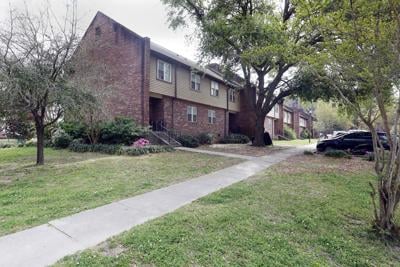CHARLESTON — The city housing authority’s plan to redevelop one of its smallest apartment complexes has been fraught with delays, but before the end of this year demolition work is expected to start at 275 Huger St.
The two-story buildings with a total of 12 apartments are slated to be replaced by a taller, 77-apartment complex in the same peninsula location for people with a range of incomes.
Plans call for just as many low-income apartments as before, with the rest being for those with incomes closer to the mid-point for the area.
Approval of the building design from Charleston’s Board of Architectural Review was the last review that required a vote. The developers immediately applied for a building permit.
“It’s definitely a huge milestone for 275 Huger,” said Ward Mungo, whose construction company is co-developing the site with Ray Nix Development.

Redevelopment plans were announced more than four years ago but ran into problems with financing due to changes made by the state and with the original design. Few hurdles now remain.
“We’re in fifth gear, we’re rockin’ and rolling,” Mungo said. “Barring any surprises, we will be starting on the demolition of the existing units before Christmas.”
The Mungo and Nix companies worked together before, with the housing authority, on the Esau Jenkins Village housing for low-income seniors on Johns Island.
The apartments at 275 Huger are vacant; the tenants having been relocated in advance of the redevelopment, Mungo said. The site is between Meeting Street and Interstate 26, and the authority’s property is bracketed on three sides by large apartment complexes built in recent years.
Art Milligan Jr., CEO of the housing authority, called the redevelopment plan and the design approval from the BAR “a win for the city, for our residents, and for the future of Charleston.”
The new apartments are expected to be ready for tenants by 2027.
The Huger Street complex is a small one for the housing authority, but it will be part of a very big plan. The authority has set out to demolish and redevelop most of the low-income apartments it owns on the Charleston peninsula, which together occupy about 40 acres of land.

The public housing projects Cooper River Courts and Meeting Street Manor on Charleston’s upper peninsula are pictured in 2020. The Charleston Housing Authority plans to demolish and redevelop the properties as mixed-income communities.
As with Huger Street, the authority has pledged that the new buildings will have just as many low-income apartments as currently exist. They would be joined by a much larger number of apartments — potentially 2,000 or so — priced as workforce housing, or at full market rates.
The blend of incomes and rents is expected to make the plans work financially, and would also end the current arrangement where low-income tenants are clustered together in low-slung housing projects that cover many city blocks.
An Atlanta company, Integral, has been hired for the largest redevelopment plans, involving the Cooper River Courts, Meeting Street Manor, and Gadsden Green complexes.


